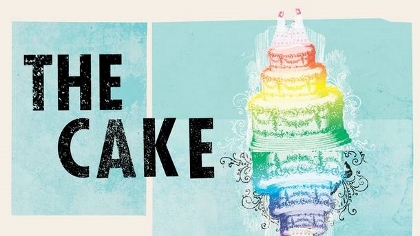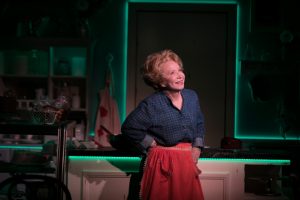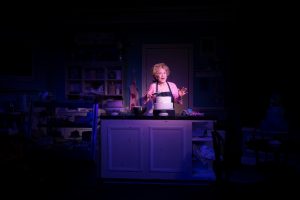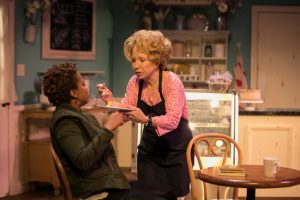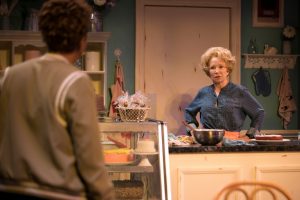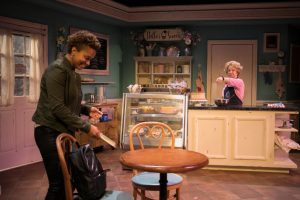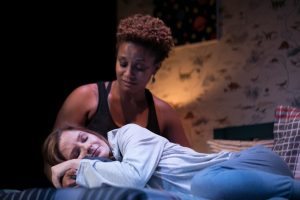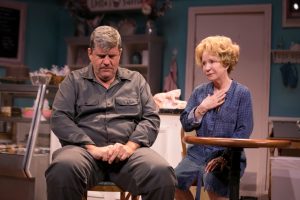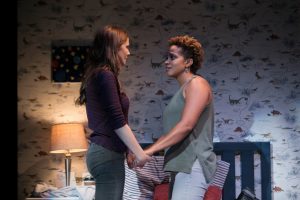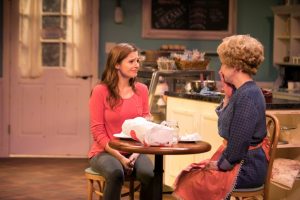LOVE AND TOLERANCE BEGIN AT HOME
Debra Jo Rupp is like a hurricane in miniature. She takes us inside a character’s small, unexpected, interior storms. We see and feel her mind and emotions churning. Sometimes she lets all that energy propel itself outward, and she bounces around the stage with adorable comic effect. Other times she keeps it trapped inside. She barely moves. It is like the hurricane inverts, and the calm eye is outside, while the ferocious winds and waves tear her apart from within.
This is a quality Ms. Rupp brings into everything I’ve ever seen her in — from her stage work in the late Cynthia Heimel’s A Girl’s Guide to Chaos in the late ‘80s, through playing Dr. Ruth off Broadway two seasons ago, to her years on That ’70s Show, and now in Bekah Brunstetter’s new play, The Cake, an Echo Theater Company production at the Audrey Skirball Kenis Theater at the Geffen Playhouse.
She plays Della, a Christian, and a baker of some note in North Carolina, who is about to be one of twelve contestants on a fictionalized American version of the Great British Bakeoff. She is thrilled, happily planning her trip to Hollywood for the taping. But she is surprised by the arrival of her beloved “unofficial” goddaughter Jenny (now Jen), who returns from New York with the altogether surprising news that she is getting married to a woman, Macy.
Jen wants Della to bake the wedding cake. Della is torn between her love and acceptance of Jen, but her inability to reconcile a same-sex marriage with her Christian identity. What may seem like a simple choice set within a simple narrative emerges as a complex exploration of roots, faith, family, and love. Baked goods have everything and nothing to do with it.
No one needs to explain the literal and symbolic importance of wedding cakes to me. My husband Ronald Shore was once a baker. He did Bruce Springsteen’s wedding cake, among many others. And he taught me how to make real French buttercream; a mind-blowingly complex process of egg whites, boiled sugar water to a precise “firm-ball” temperature (118 to 120 °C or 244 to 248 °F), cream of tartar, and tons of unsalted butter, fed bit by bit into the mixer as the whole thing expands and collapses, as if breathing. Butter is its oxygen.
One batch takes about two hours, and it is worth it. The stuff is delicate enough to melt in your mouth yet strong enough to be formed into just about any kind of decoration. The rub is that one misstep and the whole thing falls apart. And this is how Della brings us into the world of Ms. Brunstetter’s play, by inferring a parallel between the inviolate science of baking and the inviolate faith of her religion. And you get it. It is a brilliant way to take us beyond our preconceptions, allowing us to accept that someone else’s beliefs might be real and meaningful.
This allows us to find tolerance, a word and a concept often misused by people on all sides of the political and social spectrum. What it means literally is the ability or willingness to accept something; particularly the existence of opinions or behavior that one does not necessarily agree with. In practice what it usually means is that I will accept you if you agree with me. If you do not, then you are evil.
Ms. Brunstetter makes Della the most tolerant of her characters. Della accepts the value of human beings, even, especially, the ones she fears may be gambling with their immortal souls. She opines that a way to convert members of Isis would be to bake each and every one of them a cake with his or her name written on it in icing. She cannot conceive of a world where people could hate if everyone felt loved enough to deserve a cake.
The play draws connections everywhere. Della‘s husband, Tim, and Jen’s intended, Macy, are not dissimilar. Both can be strident and controlling. Both are sometimes unable to understand or respect the feelings and ideas of their partners. To me, Jen and Macy do not seem headed for a particularly successful marriage, but I love that choice. Same-sex partners need not be a couple in the mold of Edmund White’s “Best Little Boy in the World” to warrant tolerance or be entitled to civil rights. Nor does a Christian couple need to have children to justify having sex.
Director Jennifer Chambers gets the tone just right. There are big moments of slapstick silliness involving food that open up into poignance. Ms. Chambers skillfully manages these changes in mood. A running theme is Della’s imagined interactions with the host of the television baking show she is about to be on. They start out broadly funny, but end up, like everything else, mattering more than you think they will. Is the host a stand-in for Jesus? Is he a representation of Della’s subconscious? He is certainly more than easy satire; and playwright and director are in sync on that.
The cast is quite effective. As Jen, Shannon Lucio ably portrays how torn the character feels. When Jen returns to her roots, she sees that the lack of acceptance she feels in North Carolina for her sexuality is equaled by the lack of acceptance she feels in New York for her ties to family and faith. Ms. Lucio is tender and lucid. Rod McLachlan shows us Tim’s rigidity while also fully revealing his insecurity, never letting the character’s love for Della fall in doubt. Macy is a character conceived with a certain amount of stridency that might be off-putting, but Carolyn Ratteray ably finds much more in Macy than militancy. Not to be forgotten, Morrison Keddie is quite good as the off-stage television host, warm, funny, then unctuous, and finally kind of scary.
Scenic designer Pete Hickok creates a charming environment with some surrealistic touches. Lighting designer Pablo Santiago and sound designer Jeff Gardner ably transport us between the real and the imagined. Costume designer Elizabeth Caitlin Ward is wonderful. There are two stunners for the wedding itself, but the real value of her work is in the seemingly effortless way the characters’ clothes tell us so much about them. No one looks like a stereotype.
Press materials for The Cake cite Ms. Brunstetter’s concern when she was writing it that a play centering on a wedding cake controversy might be dated. This was during the tail-end of the Obama administration. The advent of Trump and a rising tide of divisiveness reignited her belief in the project. She need not have been concerned. Her love for her own people (she comes from a conservative Baptist community in North Carolina) is ageless, and she has succeeded at bringing us into their world. She has created moments of true tolerance, an achievement that transcends shifts of the political wind. Plus, as you leave the theater, they serve red velvet cake. And I’m with Della. Cake transcends everything.
photos by Chris Whitaker
The Cake
Audrey Skirball Kenis Theater at the Geffen Playhouse
10866 Le Conte Avenue in Westwood
Tues-Fri at 8; Sat at 3 & 8; Sun at 2 & 7
ends on October 21, 2018
for tickets, call 310.208.5454 or visit Geffen Playhouse
